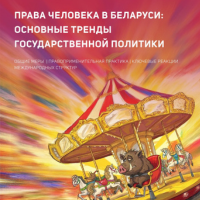
The overview of the trends for September–December 2024 (in English) has been published, along with the short presentation on the situation for the entire year (unfortunately, this presentation is available only in Russian).
In the third trimester, it was clear that the state had entered a second phase of legalizing repression, introducing even harsher amendments to laws that had already been modified in a repressive manner.
In the image generated by Shutterstock.AI, a tired little wild boar is unable to step off the revved-up carousel. It is critical that we not only get off the carousel but also bring it to a complete halt.
Of course, this metaphor simplifies reality. Find out about all the trends at trends.belhelcom.org.
Subscribe to analysis of human rights trends in Belarus by Belarusian Helsinki Committee
Among the trends:
→ Spheres of legalizing repression in 2024: gender identity, sexual orientation, reproductive choice, personal data, law enforcement powers, employment, access to professions for different groups, expanding the grounds for criminal liability, social protection measures for children, pensions, education, culture, Belarusians abroad, freedom of association for children.
→By the end of the year, it was clear that the state had entered a second phase of legalizing repression, introducing even harsher amendments to laws that had already been modified in a repressive manner. This tightening of the legal framework raises the question of whether it aims to close gaps in hastily adopted repressive laws or simply reflects a continuing need to maintain the repressive system as available punitive tools diminish.
→ Reporting the location or movement of the Russian military equipment in Belarus has become expressly criminalized. A new offense has been introduced: "Unauthorized dissemination of information about the location or movement of military units, weaponry, military equipment, and ammunition”. Prior to this, individuals were prosecuted for such actions under other articles, including those criminalizing facilitating extremist activity (Art. 361-4), participation in an extremist formation (Art. 361-1), and high treason (Art. 356). This is another example of the state formalizing possibilities for retroactive criminal liability to justify arbitrary prosecutions for the acts that were previously punished under unrelated articles, often disconnected from the actual behavior.
→ Authorities appear to be seeking new legal grounds for politically motivated criminal prosecutions of Belarusians who have been forced to flee the country. There has been a significant expansion of legal grounds for transnational repression. The number of offenses under the Belarusian Criminal Code for which individuals can be prosecuted while committed abroad increased from three to seventeen. When this repressive provision (paragraph 1-1 of Article 6) was originally introduced, it applied to only three offenses related to the disclosure of state secrets. Today, its scope has widened considerably, encompassing virtually any activity — not only by representatives of democratic forces, but also by experts, human rights defenders, and ordinary Belarusians living abroad.
→ A trend that began in 2023 — the departure from the formal equality principle — is taking on new forms. Despite several positive legislative changes regarding criminal liability, such as the introduction of alternative sentences and reduced penalties, these do not apply to individuals convicted under "extremist" articles, which, in practice, means politically motivated cases. This exclusion is explicitly stated in provisions concerning the cancellation of prison sentences and the lifting of pretrial detention as a preventive measure.
→ The policy and practice of persecuting the LGBTQ+ community continue to evolve. Firstly, at the legislative level, the list of information deemed harmful to children's health and development has been expanded to include content "aimed at promoting homosexual relationships, gender transition, pedophilia, and child-free [lifestyle]". Secondly, in the last quarter of 2024, direct persecution of the LGBTQ+ community has intensified, with increased detentions and arrests.
→ Simultaneously, a legal basis has been established for arbitrarily restricting children's freedom of association. The relevant article in the Law on the Rights of the Child has been amended, now framing restrictions on freedom of association as follows: "...provided that the activities of such associations do not aim to promote terrorism, other extremist activities, or any other acts prohibited by law, nor allow for the possibility of engaging in such activities while pursuing their legitimate objectives”.
→ The use of arbitrary extrajudicial mechanisms lacking any procedural safeguards is expanding both geographically and in scope. Thus, the competence and mandate term of the Return Commission have been extended. The Commission’s mandate has been extended indefinitely: not only Belarusians abroad but also those inside the country can now appeal to the Commission, "in accordance with the President's instruction"; the range of issues the Commission can address has expanded, including the power to make "other decisions necessitated by the implementation of presidential decisions".
About the Review of Trends
This review will highlight the substantive changes in Belarusian public policy in the field of human rights and reactions to it of the international community in three areas:
- general measures: systemic things — legislation, strategies, policies, that generally determine the conditions and background for the implementation of human rights in Belarus;
- law enforcement practice: concrete violations of civil and political rights, as well as in the field of social, economic, and cultural rights;
- key decisions and reactions of international institutions regarding the situation with human rights in Belarus.
Our analytics is for a better understanding of the trends and situation with human rights in Belarus and for the possibility of monitoring systemic and essential changes, as well as for expanding the human rights focus in related expert spheres (economic, political, social, etc.). It also can be used for justification of positions, opinions, policies, and strategies.




